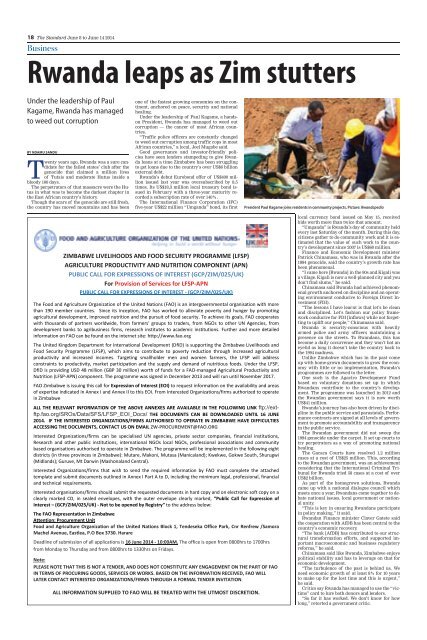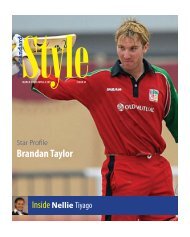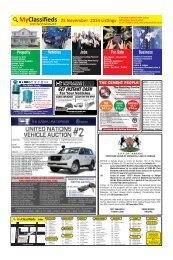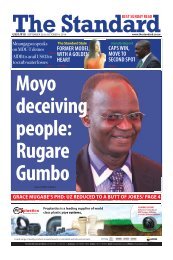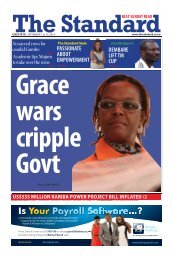Create successful ePaper yourself
Turn your PDF publications into a flip-book with our unique Google optimized e-Paper software.
18 <strong>The</strong> <strong>Standard</strong> <strong>June</strong> 8 to <strong>June</strong> 14 <strong>2014</strong><br />
Business<br />
Rwanda leaps as Zim stutters<br />
Under the leadership of Paul<br />
Kagame, Rwanda has managed<br />
to weed out corruption<br />
BY NDAMU SANDU<br />
Twenty years ago, Rwanda was a sure candidate<br />
for the failed states’ club after the<br />
genocide that claimed a million lives<br />
of Tutsis and moderate Hutus inside a<br />
bloody 100 days.<br />
<strong>The</strong> perpetrators of that massacre were the Hutus<br />
in what was to become the darkest chapter in<br />
the East African country’s history.<br />
Though the scars of the genocide are still fresh,<br />
the country has moved mountains and has been<br />
one of the fastest growing economies on the continent,<br />
anchored on peace, security and national<br />
healing.<br />
Under the leadership of Paul Kagame, a handson<br />
President, Rwanda has managed to weed out<br />
corruption — the cancer of most African countries.<br />
“Traffic police officers are constantly changed<br />
to weed out corruption among traffic cops in most<br />
African countries,” a local, Joel Mugabe said.<br />
Good governance and investor-friendly policies<br />
have seen lenders stampeding to give Rwanda<br />
loans at a time Zimbabwe has been struggling<br />
to get loans due to the country’s over US$6 billion<br />
external debt.<br />
Rwanda’s debut Eurobond offer of US$400 million<br />
issued last year was oversubscribed by 8,5<br />
times. Its US$18,3 million local treasury bond issued<br />
in February with a three-year maturity recorded<br />
a subscription rate of over 140%.<br />
<strong>The</strong> International Finance Corporation (IFC)<br />
five-year US$22 million “Umganda” bond, its first<br />
President Paul Kagame joins residents in community projects. Picture: Rwandapedia<br />
ZIMBABWE LIVELIHOODS AND FOOD SECURITY PROGRAMME (LFSP)<br />
AGRICULTURE PRODUCTIVITY AND NUTRITION COMPONENT (APN)<br />
PUBLIC CALL FOR EXPRESSIONS OF INTEREST (GCP/ZIM/025/UK)<br />
For Provision of Services for LFSP-APN<br />
PUBLIC CALL FOR EXPRESSIONS OF INTEREST - (GCP/ZIM/025/UK)<br />
<strong>The</strong> Food and Agriculture Organization of the United Nations (FAO) is an intergovernmental organisation with more<br />
than 190 member countries. Since its inception, FAO has worked to alleviate poverty and hunger by promoting<br />
agricultural development, improved nutrition and the pursuit of food security. To achieve its goals, FAO cooperates<br />
with thousands of partners worldwide, from farmers’ groups to traders, from NGOs to other UN Agencies, from<br />
development banks to agribusiness firms, research institutes to academic institutions. Further and more detailed<br />
information on FAO can be found on the internet site: http://www.fao.org<br />
<strong>The</strong> United Kingdom Department for International Development (DfID) is supporting the Zimbabwe Livelihoods and<br />
Food Security Programme (LFSP), which aims to contribute to poverty reduction through increased agricultural<br />
productivity and increased incomes. Targeting smallholder men and women farmers, the LFSP will address<br />
constraints to productivity, market participation and the supply and demand of nutritious foods. Under the LFSP,<br />
DfID is providing USD 48 million (GBP 30 million) worth of funds for a FAO-managed Agricultural Productivity and<br />
Nutrition (LFSP-APN) component. <strong>The</strong> programme was signed in December 2013 and will run until November 2017.<br />
FAO Zimbabwe is issuing this call for Expression of Interest (EOI) to request information on the availability and areas<br />
of expertise indicated in Annex I and Annex II to this EOI. From Interested Organizations/firms authorized to operate<br />
in Zimbabwe<br />
ALL THE RELEVANT INFORMATION OF THE ABOVE ANNEXES ARE AVAILABLE IN THE FOLLOWING LINK ftp://extftp.fao.org/SROs/Data/SFS/LFSP_EOI_Docs/<br />
THE DOCUMENTS CAN BE DOWNLOADED UNTIL 16 JUNE<br />
<strong>2014</strong>. IF THE INTERESTED ORGANIZATIONS/FIRMS AUTHORISED TO OPERATE IN ZIMBABWE HAVE DIFFICULTIES<br />
ACCESSING THE DOCUMENTS, CONTACT US ON EMAIL ZW-PROCUREMENT@FAO.ORG<br />
Interested Organizations/firms can be specialised UN agencies, private sector companies, financial institutions,<br />
Research and other public institutions, international NGOs local NGOs, professional associations and community<br />
based organisations authorised to operate in Zimbabwe. <strong>The</strong> programme will be implemented in the following eight<br />
districts (in three provinces in Zimbabwe): Mutare, Makoni, Mutasa (Manicaland); Kwekwe, Gokwe South, Shurugwi<br />
(Midlands); Guruve, Mt Darwin (Mashonaland Central).<br />
Interested Organizations/firms that wish to send the required information by FAO must complete the attached<br />
template and submit documents outlined in Annex I Part A to D, including the minimum legal, professional, financial<br />
and technical requirements.<br />
Interested organisations/firms should submit the requested documents in hard copy and on electronic soft copy on a<br />
clearly marked CD, in sealed envelopes, with the outer envelope clearly marked, “Public Call for Expression of<br />
Interest – (GCP/ZIM/025/UK) - Not to be opened by Registry” to the address below:<br />
<strong>The</strong> FAO Representation in Zimbabwe<br />
Attention: Procurement Unit<br />
Food and Agriculture Organization of the United Nations Block 1, Tendeseka Office Park, Cnr Renfrew /Samora<br />
Machel Avenue, Eastlea, P.O Box 3730. Harare<br />
Deadline of submission of all applications is 16 <strong>June</strong> <strong>2014</strong> - 10:00AM. <strong>The</strong> office is open from 0800hrs to 1700hrs<br />
from Monday to Thursday and from 0800hrs to 1330hrs on Fridays.<br />
Note:<br />
PLEASE NOTE THAT THIS IS NOT A TENDER, AND DOES NOT CONSTITUTE ANY ENGAGEMENT ON THE PART OF FAO<br />
IN TERMS OF PROCURING GOODS, SERVICES OR WORKS. BASED ON THE INFORMATION RECEIVED, FAO WILL<br />
LATER CONTACT INTERESTED ORGANIZATIONS/FIRMS THROUGH A FORMAL TENDER INVITATION.<br />
ALL INFORMATION SUPPLIED TO FAO WILL BE TREATED WITH THE UTMOST DISCRETION.<br />
local currency bond issued on May 15, received<br />
bids worth more than twice that amount.<br />
“Umganda” is Rwanda’s day of community held<br />
every last Saturday of the month. During this day,<br />
citizens gather to do community work and it is estimated<br />
that the value of such work to the country’s<br />
development since 2007 is US$60 million.<br />
Finance and Economic Development minister<br />
Patrick Chinamasa, who was in Rwanda after the<br />
1994 genocide, said the country’s growth rate has<br />
been phenomenal.<br />
“I came here [Rwanda] in the 90s and Kigali was<br />
a village. Kigali is now a well-planned city and you<br />
don’t find slums,” he said.<br />
Chinamasa said Rwanda had achieved phenomenal<br />
growth anchored on discipline and an operating<br />
environment conducive to Foreign Direct Investment<br />
(FDI).<br />
“<strong>The</strong> lessons I have learnt is that let’s be clean<br />
and disciplined. Let’s fashion our policy framework<br />
conducive for FDI [inflows] while not forgetting<br />
to uplift our people,” Chinamasa said.<br />
Rwanda is security-conscious with heavily<br />
armed police and army officers maintaining a<br />
presence on the streets. To Rwandans, this has<br />
become a daily occurrence and they won’t bat an<br />
eyelid as long it doesn’t take the country back to<br />
the 1994 madness.<br />
Unlike Zimbabwe which has in the past come<br />
up with home-grown documents to grow the economy<br />
with little or no implementation, Rwanda’s<br />
programmes are followed to the letter.<br />
One such is the Agaciro Development Fund<br />
based on voluntary donations set up in which<br />
Rwandans contribute to the country’s development.<br />
<strong>The</strong> programme was launched in 2012 and<br />
the Rwandan government says it is now worth<br />
US$41 million.<br />
Rwanda’s journey has also been driven by discipline<br />
in the public service and parastatals. Performance<br />
contracts are signed at all levels of government<br />
to promote accountability and transparency<br />
in the public service.<br />
<strong>The</strong> Rwandan government did not sweep the<br />
1994 genocide under the carpet. It set up courts to<br />
try perpetrators as a way of promoting national<br />
healing.<br />
<strong>The</strong> Gacaca Courts have resolved 1,2 million<br />
cases at a cost of US$25 million. This, according<br />
to the Rwandan government, was an achievement<br />
considering that the International Criminal Tribunal<br />
for Rwanda tried 58 cases at a cost of over<br />
US$2 billion.<br />
As part of the homegrown solutions, Rwanda<br />
came up with a national dialogue council which<br />
meets once a year. Rwandans come together to debate<br />
national issues, local government or national<br />
unity.<br />
“This is key in ensuring Rwandans participate<br />
in policy making,” it said.<br />
Rwandan Finance minister Claver Gatete said<br />
the cooperation with AfDB has been central to the<br />
country’s economic recovery.<br />
“<strong>The</strong> bank [AfDB] has contributed to our structural<br />
transformation efforts, and supported important<br />
macroeconomic and business regulatory<br />
reforms,” he said.<br />
Chinamasa said like Rwanda, Zimbabwe enjoys<br />
political stability and has to leverage on that for<br />
economic development.<br />
“<strong>The</strong> turbulence of the past is behind us. We<br />
need economic growth of at least 8% for 10 years<br />
to make up for the lost time and this is urgent,”<br />
he said.<br />
Critics say Rwanda has managed to use the “victims”<br />
card to lure both donors and lenders.<br />
“So far it has worked. We don’t know for how<br />
long,” retorted a government critic.


